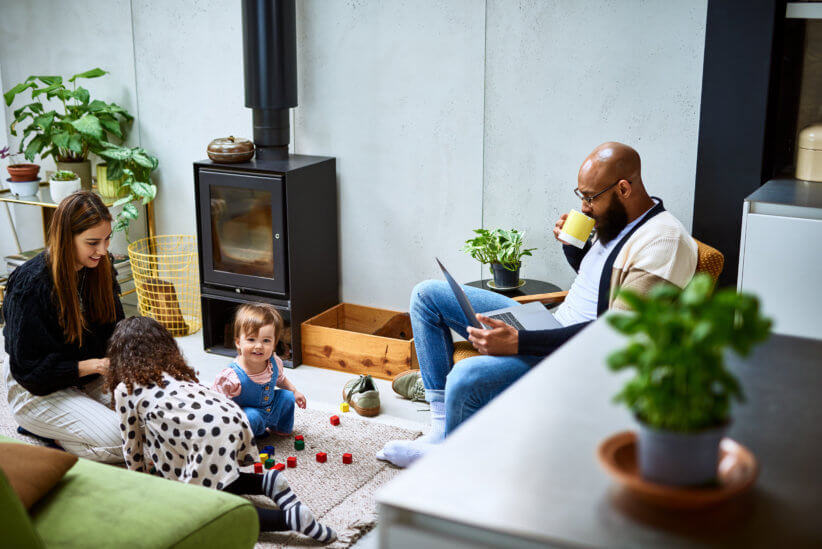
The New Normal: Expert Tips on Getting Back to IRL
Many of us are in a bit of a recovery mode. The pandemic was uncharted territory for the entire family, and life did always feel steady. And as we work to get back to the “new normal,” it has maybe felt a bit challenging. I chatted with Jess Huddy, Chief Learning Officer of Cognition Builders. Cognition Builders is a global organization that employs a specialized team to resolve individuals’ and families’ behavioral, intellectual, social, emotional, cognitive, and academic needs.
If you or your family are feeling a bit off, you’re not alone; we are coming off a historic and frankly weird time, and now is the moment to get guidance from the experts. From how to prevent conflict with your partner to repeating mantras when in a challenging time, these helpful tips will help you get to your new normal.
Many families are returning to work-life and school IRL next month. Kids will be resocializing full-time, and parents who have been with their children 24/7 will now be with their peers again. What advice (or tips) can you share with parents on dealing with the mixed bag of emotions some may be experiencing (I know I am!) going back to the new normal in the upcoming months?
Change is a normal part of life. Pandemics are not. While we’ve all been (im)patiently waiting for the return to normal, now that it’s here, it’s hard to know how to feel.
To get some control in these uncontrollable times, we can all start by watching what we say — and think. Of course, we all like to vent. After a year of virtual learning, we all NEED to vent. But when pessimism becomes our first language, we start to see life as a series of problems and inconveniences. What we think determines how we feel.
This doesn’t mean we should all sugarcoat our frustrations and pretend everything is amazing. Instead, the key is to speak and think about life’s challenges in a way that is reflective, not reactive.
What does that even mean? Here’s an example: Let’s imagine you’re feeling rusty in your role on the first day back in the office. If you’re being reactive, you might tell yourself, “I can’t remember how to do anything. I’ve lost my talent.” This kind of self-talk is self-sabotage.
But if you respond reflectively, you might think: “Today didn’t run smoothly. It will take some time to get the rhythm again.” Here, you’re acknowledging the problem, considering it objectively, and leaving room for a solution.
Another good trick? Repeating encouraging mantras. It sounds cliché, but the research backs it. Some that might apply:
- The changes ahead will be challenging, but bearable.
- It will take time for new/old routines to feel right again, but they will.
- My family and I can, and will, adjust.
Equally as important as what you say: what you do. If you don’t prepare for the first day of in-person work/school, you’ll be left with a ton of dread. Be proactive in getting ready for all things IRL — and help your kids do the same.
How? Make a shared family calendar and review the new schedules together. Create (or recreate) daily routines you’ll keep when school and work are back in-person: shift sleep schedules, pack backpacks at night, time your commutes. Make your day-to-day adjustments now, before the return to normal forces you to improvise. If you’re comfortable doing so, warm up to more social interaction, too. Start scheduling playdates regularly, get out of the house and in public more often; desensitize yourselves to socializing.
There is firm data that mothers experience the ‘Motherhood Penalty’ during the pandemic lockdown. This is not to say that their partners did not step up, but statistically, women spent more time on childcare during the pandemic. One of your missions at Cognition Builders is to “eliminate the conflicts which crack the foundations of everyday life”. How can a marriage learn from this experience and be more unified?
When the pandemic shut us in our homes for a year, family problems grew like weeds. Time-at-home was all-the-time: no school, no breaks, no boundaries. Lockdown took a magnifying glass to our worst habits and forced us to face their consequences.
Mothers have long taken on the bulk of childcare, but COVID-19 sent this imbalance through the roof. Part of the problem — pre, during, and post-pandemic — is assumption. Most often, couples don’t ever actually discuss who will be responsible for what. Instead, each partner falls into their set of responsibilities — for mothers, that typically includes most of the childcare — and everyone autopilots. They go on like this until resentment boils over and forces the issue to a head.
To prevent conflict, couples should sit down and intentionally discuss how childcare — and all other shared responsibilities — will be divided. During this conversation, it’s important to:
- Be specific. For example: Dad is doing bath time on Monday, Tuesday, and Friday; Mom is doing bath time on Wednesday and Thursday.
- Be honest. Share ideas, preferences, suggestions, and be open to discussing them. For those who like to appease: remember that confrontation is not conflict. Write down your thoughts before talking with your partner, so you know what you really want.
- Level the field (if needed). When one partner takes over on certain tasks, all that practice can make them faster and “better.” But when we tell our partners: “It’s just easier if I/you do_____,” we’re choosing long-term bitterness for the sake of short-term convenience. Instead, both partners should be equally equipped to handle the things that need to get done, even if that means doing a little learning upfront.
- Not get stuck on 50/50. What’s right looks different for every family. If partners agree that labor division is fair, realistic, and acceptable to everyone, then that’s a successful outcome.
- Follow through. A plan is only good if it’s used. Partners should hold each other accountable and be accountable to one another.
- Be flexible. What works now won’t always work. Things change, children grow, and we all need to reorganize responsibilities from time to time. Or, we may put the plan in play and find it only worked on paper. Regroup! Start back at step one.
My son is officially a tweenager. I thought I’d be the cool mom but the words and things that come out of my mouth at the heat of the moment are cringe-worthy. I worry that in this period of my son’s growth, we will never be close again. Help.
Very few things are cool in the eyes of a tweenager… least of all their moms. Preteens love to dunk on us. The harder we try, the more they know we want it, the more satisfying the dunk. It is a vicious cycle, so free yourself of the need to be considered cool. It’ll come (much) later.
You can’t earn your son’s favor — or respect — by pleasing him all the time. Parenting decisions shouldn’t be based on what our kids want in-the-moment, because it typically doesn’t overlap with what they need. If you don’t serve your son’s best interests now, then you really will run the risk of not being close in the future.
As for the heat of the moment, you do want to make sure you’re setting the right example. A few, simple rules:
- Don’t respond to insults (or any other inappropriate language). For example, if you ask your son to complete a chore and he calls you a name in response, resist the temptation to ask, “WHAT did you just say to me?!” Instead, ignore the comment outright and repeat your initial request. Then disengage.
- Walk away when emotions are running high. If your son is yelling, for example, don’t try to reason with him. Instead, say: “We will continue this conversation when you’re feeling less angry.” Then walk away.
- Hold the line. Don’t be derailed by requests for “five more minutes,” complaints, negotiation attempts, or any other clever method used to subvert the rules. Once you place a demand, make sure you get compliance and don’t backpedal. (If not, that’s what consequences are for).
Psst… check out Chores for Kids: How to Get Them Started
Jess Huddy (M.S., M.A., LAC) is the Chief Learning Officer of Cognition Builders. In this role, Huddy serves as Cognition Builders’ lead strategist on curricula and program development. Huddy holds two master’s degrees in psychology and clinical mental health counseling, respectively, and is a licensed associate counselor. In 2018, Huddy co-authored “Say This, Not That To Your Teenage Daughter,” published by Andrews McMeel. She is a three-time published poet and, most importantly, proud mama to Emmeline.























